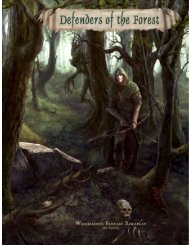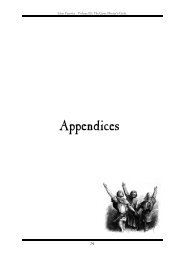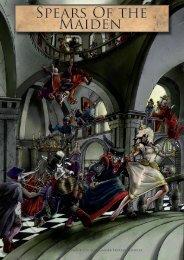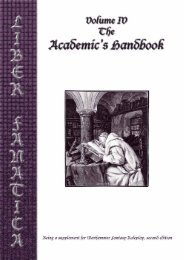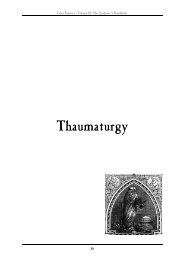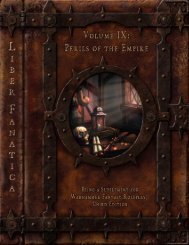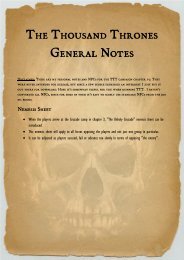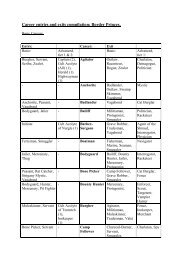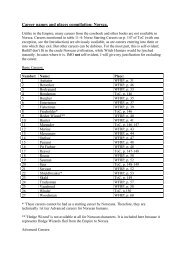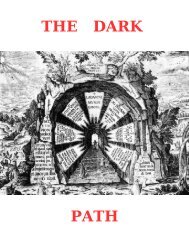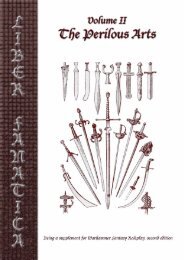Download Here (5.27 MB) - Liber Fanatica
Download Here (5.27 MB) - Liber Fanatica
Download Here (5.27 MB) - Liber Fanatica
Create successful ePaper yourself
Turn your PDF publications into a flip-book with our unique Google optimized e-Paper software.
Introduction<br />
by Henrik Grönberg<br />
T<br />
his part of the guide contains several tools<br />
for GMs running WFRP. Although the GM is<br />
free to use these in any way imaginable, a few<br />
notes are provided in order to help in doing so. It<br />
should be noted that the scope of these tools is<br />
limited in several ways. Firstly, they are written<br />
with the Empire and Humans in mind. Although<br />
this doesn’t mean you can’t use them for<br />
characters of other races and nationalities, or for<br />
scenarios set outside the Empire, you’ll have to<br />
tweak or re-roll the results a lot more often.<br />
Secondly, most tables come with a random<br />
generation (“dice decision”) option. If this is used,<br />
far from all results will be grammatically correct,<br />
make sense or be of any help. Thirdly, all tables<br />
represent only a limited selection of possible<br />
entries. However, if they spur your imagination to<br />
come up with alternatives, they still serve a<br />
purp ose!<br />
<strong>Liber</strong> <strong>Fanatica</strong> - Volume III : The Game Master’s Guide<br />
Character Traits<br />
T<br />
his tool consists of ten sets of ten tables each<br />
listing ten entries. Each set of tables is<br />
loosely linked to one of the Ten Questions on<br />
pages 21-22 of WFRP. Each table can be read as<br />
offering fragments of answers to one of these<br />
questions and can be used during character<br />
generation to help players come up with a<br />
background for their PCs (see above).<br />
The entries in these tables are intended to serve<br />
several purposes:<br />
Improving Improvisations GMs can keep these<br />
tables handy while at the table for coming up<br />
with a few defining attributes for improvised<br />
NPCs. In this case, picking or rolling (1d10 for<br />
the set of tables, another 1d10 for which table<br />
and 1d10 for the entry) a few, say three, traits<br />
may be a good idea.<br />
Scenario Creation GMs can use the tables when<br />
creating NPCs for scenarios and campaigns<br />
(homemade or others), much in the same ways as<br />
described above.<br />
Character Generation This material is also useful<br />
for GMs and players generating player<br />
characters. For instance, players can roll once on<br />
each set of tables, 1d10 traits as above, or simply<br />
use the tables in any other way as they and the<br />
GM see fit. The resu lt won’t be a cohesive and<br />
complete personality–you still have to connect<br />
these dots–but may provide a few starting ideas<br />
for creating a personality and background.<br />
Ten Hundred Answers:<br />
Question<br />
Set of Tables<br />
1: Where are you from? Character Background<br />
2: What is your family like? Family & Heritage<br />
3: What is your social class? Social Status<br />
4: What did you do before you became an adventurer? Personal History<br />
5: Why did you become an adventurer? Personality<br />
6: How religious are you? Religiosity<br />
7: Who are your best friends and worst enemies? Friends & Enemies<br />
8: What are your prized possessions? Peculiar Possessions<br />
9: Who are you loyal to? Loyalties<br />
10: Who do you love/hate? Loves & Hates<br />
38



